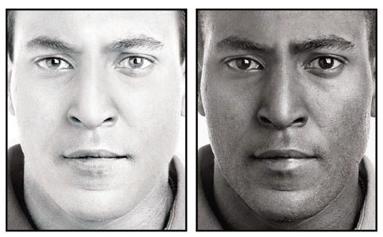 One thing I find most curious about the current public milieu is its insistence for certain kinds of identification and not for others. An example: I saw an interview where Lou Dobbs suggested Americans should stop celebrating ethnically European holidays such as Saint Patrick’s Day; reason being that we should identify not with some distant foreign heritage, which he seemed to suggest was divisive, but the contemporary public lifestyle. Asside: I wonder if he would suggest doing away with the likes of Kwanzaa or Cinco De Mio. But anyway…
One thing I find most curious about the current public milieu is its insistence for certain kinds of identification and not for others. An example: I saw an interview where Lou Dobbs suggested Americans should stop celebrating ethnically European holidays such as Saint Patrick’s Day; reason being that we should identify not with some distant foreign heritage, which he seemed to suggest was divisive, but the contemporary public lifestyle. Asside: I wonder if he would suggest doing away with the likes of Kwanzaa or Cinco De Mio. But anyway…You see this sort of hypocritical attitude more and more these days. Folks want you to identify not as race, ethnicity, sex or tribe but the broad category of species (human) or, failing that, nation state (not nationality). You hear it all the time: you’re not “white,” “black,” “Oriental,” “Nordic,” etc. because we’re all part of one race—the human race. “But a race of what?” I must then ask, as one who makes such a statement is clearly ignorant of the fact that a race is merely a variant of a larger category.
It’s obvious politically correct pandering and a double standard, as the same logic for such identification could be used for any category: our identities are overlapping and coaxial. If I am to identify not with ethnicity or race, but humanity, supposing that subspecies characterization is somehow unethical, why not take it a step further? Are we not all Hominidae? Let us cease discrimination and unite with our great ape cousins. And why stop there? Subphylum identification is racist! All mammals are Chordata; it’s high time we embraced our yellowfin tuna brethren as equals!
Of course we don’t do that: we have limited loyalties and limited tastes. All animals naturally associate with those that are most like themselves. If you know of a pet store with a large display of finches, go and observe them. Likely they will have a diverse selection. Notice that, even though there is no difference between them otherwise, any polarity of different colored finches will congregate and exclude others. It is so with any kind of animal in large enough numbers to form localities of critical mass. This in-group impulse is a hardwired survival mechanism.
The point of this article is not to denounce the notion of species identification—I see no problem in collecting as a singular humanity in the face of greater outside aggression—but that humanism alone is very limiting. Indeed, I am a human, and that constitutes a large part of my psychological identity; but I’m also a Caucasian, an American, of Welsh and German national descent, a man, a mate, a brother, a son, an autodidact, an illustrator, etc. If I were to stop at species I wouldn’t be remotely as rich a personality as I am, and the world itself would be dimmer because of it.
We are all more than just “human.” Such a stunted public practice as globalist humanism will leave mankind a monocultural, ethnically deluded, socially retarded simulacrum of itself. Instead, our modus vivendi should be nepotistic, winnowing equanimity; and we should always strive to define ourselves by our differences and our similarities, as it is all our influences and heritages that constitute who we really are.
 Shayne
Shayne
 On CNN’s website, some dingbat looking dude was paid to give his boring, Big Mac opinion about immigration [
On CNN’s website, some dingbat looking dude was paid to give his boring, Big Mac opinion about immigration [
 The fallacy here isn’t so much that injustices didn’t happen, but that they aren’t as pro-white specific as the liberals would have you believe. They see white guilt as “a tool for extortion, reparations and income redistribution based on race rather than merit.” [
The fallacy here isn’t so much that injustices didn’t happen, but that they aren’t as pro-white specific as the liberals would have you believe. They see white guilt as “a tool for extortion, reparations and income redistribution based on race rather than merit.” [

 www.inertiacide.com
www.inertiacide.com